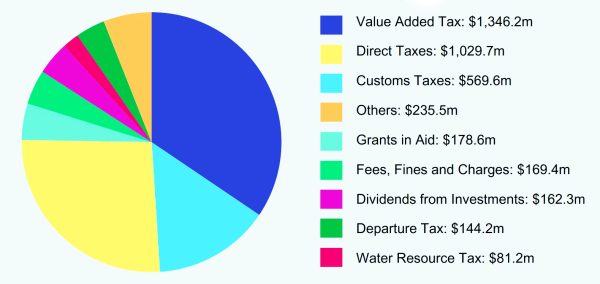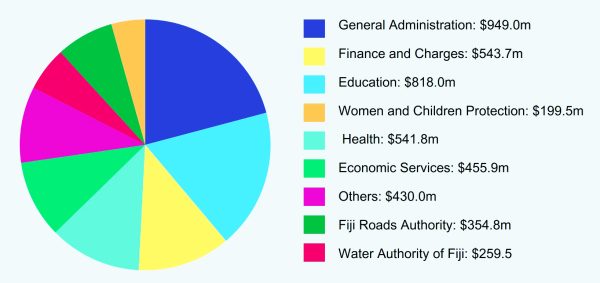Fiji’s coalition government unveiled its second budget on 28 June 2024. Announcing the budget, Finance Minister Biman Prasad said the focus is on economic stability and building the foundation for the future while aiming to address immediate concerns such as government debt, the cost of living, migration and deteriorating infrastructure. The 2024-25 budget strongly reflects the coalition government’s focus on not only raising income but also the provision of essential services such as education and health. This is not surprising as the country is experiencing a rapid exodus of skilled and unskilled workers and struggling to provide adequate healthcare services. While there is extensive support for the budget based on certain policy measures and the government’s attempt to deal with some of the immediate concerns, achieving a sustainable fiscal position and increasing economic growth remain challenges for Fiji.
The estimated decline in the debt-to-GDP ratio from 90% in 2022 to 78% in July 2024 is a positive development and reflects well on the revenue measures announced in the 2023-24 budget. The total expenditure estimate for 2024-25 is $4.5 billion against the estimated revenue of $3.9 billion. The net deficit is budgeted at $635.5 million, which is equivalent to 4.5% of GDP at market prices. The targeted fiscal deficit, which now stands at about 7% of GDP, will be covered by domestic and concessional external borrowing. However, the debt-to-GDP ratio for the fiscal year 2024-25 is estimated to decline to around 77.8% of GDP by the end of July 2025.
Figure 1: Estimated government revenue financial year 2024-25
Source: FY2024-25 Budget Citizens’ Guide.
Tax revenue is projected at $3.3 billion for 2024-25, an increase of 8.7% compared to the 2023-24 revised estimate. This is mainly due to the changes in revenue measures such as departure tax rates, excise duties on alcohol and tobacco and water tax. However, as noted from the supplement to the budget, the economic growth forecast for 2024 has been revised down to 2.8% from the earlier 3.4%. The reduction in the growth forecast is mainly driven by weakening consumption expenditure, projected low growth in tourist numbers and weak performance in the resource sector. The increase in departure tax could adversely affect the competitiveness of the tourism sector.
The growth forecast for 2025 and 2026 is only 0.2% higher than the 2024 forecast. Thus, the $3.9 billion revenue projection with low projected growth appears to be an optimistic target. Going forward it is imperative the government focus on sectors that have led to low growth and appropriately address supply-side constraints. The revised low growth could also mean that it would be challenging for the government to achieve its projected lower deficit of 3.7% and 3.5% of GDP in 2025 and 2026 respectively.
The total expenditure of $4.5 billion is 10.9% higher than the revised estimate for the 2023-24 budget. The increase in total expenditure is mostly driven by increased allocations for education, sugar production, housing, agriculture, rural development and infrastructure. We observe a notable change in the mixture of expenditure — to 73% operating expenditure and 27% capital expenditure in the 2024-25 budget as compared with 69% and 31% respectively in the 2022-23 budget.
Figure 2: Estimated government expenditure financial year 2024-25
Source: FY2024-25 Budget Citizens’ Guide.
In addition, a notable reduction of $32.8 million is observed in the allocation for the Fiji Roads Authority relative to the 2023-24 budget. Even with enhanced efficiency and an improved procurement and contracting system, the reality is that Fiji’s investment in infrastructure development is increasingly lagging. While the government’s emphasis on maintaining and fixing existing infrastructure is commendable, the decline in capital investment could adversely impact support for long-term economic growth.
The 2024-25 budget has a number of notable positive measures. The education sector received the largest allocation of $778 million. Of this, $150.5 million is allocated to tertiary scholarship and loan schemes to develop human capital and address labour shortages and skill mismatch. In addition, the government has announced a significant number of measures such as merit-based in-service overseas scholarships, grant-based support, funding support to students to pursue PhD and masters degrees in selected universities in Australia, scholarships for in-house training, a micro-qualification grant scheme, a hardship assistance scheme, and a “students with special needs” scheme. These measures together with an increased grant allocation of $5 million to Pacific Polytech will certainly ease labour shortages and promote skills matching. However, it is equally important for the government to undertake regular labour market assessments, evaluate the success of these schemes, and strengthen existing partnerships with tertiary institutions.
Furthermore, the medium- to long-term challenge is to retain young as well as experienced and productive workers. It is estimated that at least 3% of Fiji’s population has left the country and this has serious implications for both public and private service delivery. While the June review by the Reserve Bank of Fiji notes an overall decline in emigration, the launch of the Pacific Engagement Visa could increase emigration in the near future.
The focus on increasing income, including through a pay rise for civil servants, is expected to bring some relief from the high cost of living. However, the effect of this is likely to be uneven across workers and might not be sufficient. To tackle the drug crisis, a new Narcotics Bureau is set to be established with the help of the Australian Federal Police. A 5% duty on alcohol and tobacco has also been levied to curb non-communicable diseases (NCDs). A similar measure has been rolled out before but there is no evidence that it has had any positive effect on the reduction of NCDs. While the intention might be good, this appears to be simply a revenue raising measure, given the relatively inelastic demand for such goods. It is, therefore, important to design more sustainable solutions to the growth of NCDs.
Further, social protection programs (SPPs) have received a total of $171.1 million, of which $78.2 million goes to the pension scheme and $44.3 million towards family assistance. The transition of the transport allowance into cash will see those over 70 years getting $150 per month. This will provide urgent relief to poor households. SPPs such as pensions, family assistance and disability schemes are crucial as they provide a much-needed safety net for vulnerable groups in the country. The demand for a safety net has never been so important given the increase in the cost of living and poverty levels recorded over the decades. While the budget introduces other measures such as a free medical scheme, subsidies for electricity and water for those who earn below $30,000, tuition-free education, transport assistance and back-to-school support, further measures are needed to deal with the cost of living.
Finally, the implementation of the announced initiatives and the capacity to efficiently manage expenditure is the key. A major civil service and investment reform was also announced by the coalition government, which needs to be prioritised. While there are improvements in some departments and functions including the immigration department and investment facilitation, there are many inefficiencies and there is much red tape in the public service and state-owned enterprises. Thus, the government must conduct a thorough examination of the civil service and public enterprises to achieve more efficient public service delivery.




Thanks for sharing blog commenting. Thank you.